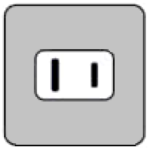Plug For Bolivia: What You Need To Know
What is the plug for Bolivia? Before you travel, check the information below to make sure your electronic devices are compatible with the outlet type and voltage.
Electrical Summary
Bolivia uses outlet types A, C at a voltage of 230V and a frequency of 50 Hz.
Plug Compatibility: Type A, Type C
Voltage: 230V
Frequency: 50 Hz
Type A

Type C

Can North Americans use Electronics in Bolivia without an Adapter?
No! North Americans may need an adapter for the outlets when traveling to Bolivia. North Americans device plugs may not work with all outlet types in Bolivia. Also, a transformer is required as the voltage in Bolivia may be different from Europe.
Please note: an adapter will be needed if your device plug has a grounding pin and you are trying to use a Type A outlet. For this reason, we always recommend traveling with a universal travel adapter.
Can Europeans use Electronics in Bolivia without an adapter?
No! Europeans may need an adapter for the outlets and a transformer for the voltage when traveling to Bolivia. European device plugs may not work with all outlet types in Bolivia. However, the voltage in Bolivia is the same as European voltages.
What Outlet does Bolivia Use?
Type A

Type C

Type A electrical plug sockets have two flat pins and no grounding pin. These outlets are typically used with devices that have a voltage of 110-120V. This outlet is rated for 15 amps. Plug Type A is compatible with this socket. All other plug types (including Type B) will need an adapter.
Type C plug sockets are used in Europe, Africa and Asia. They have two round pins and no grounding pin. These plugs are typically used with devices that have a voltage of 220-240V.
Is it safe to drink water in Bolivia?
To be on the safe side, you can use common precautions such as boiling tap water for at least one minute, using water purification tablets, or drinking bottled water. It’s also important to note that ice may be made from tap water and that foods may be washed or prepared with tap water.
We recommend always packing a filtered water bottle when traveling:
Travel Essentials
Be sure to check our list of travel essentials before your trip!
Should I get travel insurance when traveling to Bolivia?
It is generally recommended to get travel insurance when traveling to a different country. Travel insurance can provide financial protection and peace of mind in case of unexpected events, such as medical emergencies, trip cancellations, lost or stolen baggage, or other travel-related mishaps.
Travel insurance can cover various expenses related to your trip, such as medical expenses, emergency medical transportation, trip cancellation or interruption, lost or stolen baggage or personal belongings, and other travel-related expenses.
Before purchasing travel insurance, it’s important to carefully review the policy details, including the coverage limits, exclusions, and any applicable deductibles or copays. You should also make sure that the policy covers any activities or destinations that you plan to participate in or visit during your trip.
Travel Summary
The capital city, La Paz, is a must-visit destination in Bolivia. It is the highest capital city in the world, located in a stunning valley surrounded by the snow-capped Andes Mountains. Visitors can explore the city’s many museums, art galleries, and historical landmarks, including the San Francisco Church and the Witches’ Market.
Another popular destination in Bolivia is its stunning natural landscapes. The country is home to some of the most beautiful natural wonders in South America, including the Uyuni Salt Flats, the Amazon Rainforest, and Lake Titicaca, the highest navigable lake in the world. Visitors can also enjoy a variety of outdoor activities, such as trekking, mountain climbing, and wildlife watching.
Bolivia is also home to a rich cultural heritage, with influences from pre-Columbian indigenous cultures, Spanish colonialism, and more recent political and social movements. The country’s cuisine is a reflection of this diversity, with delicious dishes such as salteñas, empanadas, and ceviche. Bolivia is also famous for its colorful festivals, such as the Carnaval de Oruro and the Dia de los Muertos.
In conclusion, Bolivia is a must-visit destination for travelers seeking a unique and rewarding travel experience in South America. Its stunning natural landscapes, rich cultural heritage, and vibrant cities make it a fascinating and unforgettable destination.
Traveling to another country? Check out our Countries page for more info.